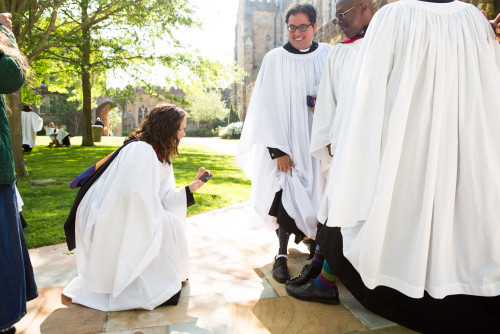The School of Theology is committed to the task of integrating the various areas of theological study within a basic core curriculum.

Drawing on the distinctive strengths of the School of Theology and the environmental studies program and affiliated departments of the College of Arts and Sciences, the M.A. with a concentration in religion and the environment is a flexible program that utilizes Sewanee’s unique ability to contribute to an internationally recognized and vibrant field of interdisciplinary inquiry. After a basic grounding in the tools of biblical studies, theology, and ethics, distribution requirements guide students so they are exposed to a variety of perspectives on environmental issues, ranging from the “hard sciences” to policy studies. Further elective work within the concentration allows the student to pursue specific interests, and a research project serves as the capstone in the concentration.
The University is home to the Center for Religion and Environment (CRE). CRE's threefold mission is to help students and the broader community integrate religious belief with care for the environment, to prepare students across the curriculum for environmentally conscientious work and ministry, and to serve as a focal point for University-wide initiatives related to religion and the environment.
Core CURRICULUM
| Old Testament I: From Prehistory to the Promised Land | Old Testament II: Prophets, Exile, and Aftermath |
| New Testament I: The Gospels in Context | New Testament II: The Gospel after Jesus |
| Church Histories I: Asia & Africa | Church Histories II: Europe & America |
| Systematic Theology I | Introduction to Moral Theology |
| Research Project |
ELECTIVE CURRICULUM
| Environmental Theology (Select One) | Environmental Science (Select One) |
| Many Sides of Sustainability | Field Investigations in Biology |
| God and Nature | Advanced Conservation Biology |
| Readings in Contemporary Eco-Theology | Ecology (Lab) |
| Creation, Evolution, and God | Biodiversity: Pattern & Process (Lab) |
| Reading in Teilhard de Chardin | Introduction to Forestry (Lab) |
| Physical Geology (Lab) | |
| Environmental Policy (Select One) | |
| Water Resource Policy & Law | Comparative Religious Environmentalism (Select One) |
| International Environmental Policy | Religion Environmentalism |
| Environmental Policy & Law | Religion & Ecology |
| Environmental Economics | Buddhism and the Environment |
| Environmental Ethics (Select One) | Additional Approved Electives (Twelve Hours) |
| Environmental Ethics (PHIL 230) | |
| Environmental Ethics (CEMT 560) | |
| Climate Ethics |
Learning Outcomes
-
Students demonstrate a knowledge of religious heritage.
-
Students demonstrate academic proficiency in theological disciplines in order to produce a thesis or capstone project in their chosen field of study.
-
Students will demonstrate an advanced degree of competence in the synthesis of religious traditions with environmental studies and practical environmental issues.



